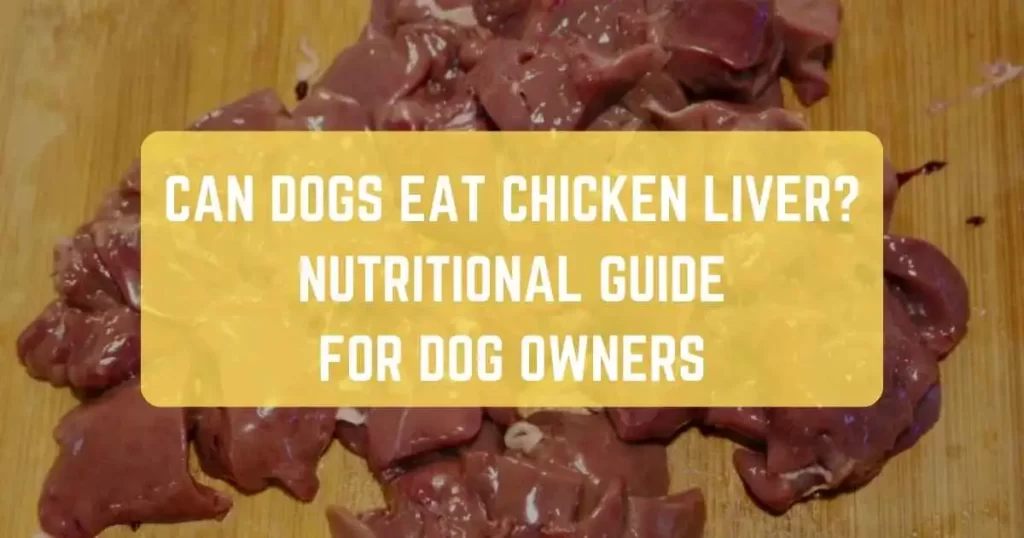
When it comes to your beloved canine companion, what you feed them isn’t just about dog food—it’s about their health, happiness, and well-being.
One question that often lingers in the minds of dog owners is whether their furry friend can eat liver, particularly chicken liver. The answer might surprise you, as it’s a tale of nutritional riches and potential pitfalls.
As we delve into the world of “Can dogs eat chicken liver?” we’ll uncover the physiological hooks and the urgency behind understanding the benefits, risks, and best practices for feeding this organ meat to your canine.
So, join us on this journey to make the best dietary decisions for your four-legged family member.
Can Dogs Eat Chicken Liver?
Yes, dogs can eat chicken liver. It’s not toxic to dogs, and in moderation, it can be a healthy addition to their diet. Chicken liver is a great source of protein, essential fatty acids, and a variety of vitamins and minerals.
However, it’s crucial to approach this with caution and moderation, as excessive consumption can lead to health issues. If you decide to introduce chicken liver to your dog’s diet, do so gradually and keep an eye on their response.
Health Benefits of Chicken Liver For Dogs
Adding chicken liver to your dog’s diet can be beneficial in various ways. Here are some of the key advantages:
- Rich in Protein: Chicken liver is an excellent source of high-quality protein, which is essential for building and repairing tissues in your dog’s body.
- Packed with Vitamins: It contains a range of vitamins, including vitamin A, B vitamins (B1, B2, B3, B5, B6, B9, and B12), vitamin D, and vitamin E. These vitamins are crucial for your dog’s overall health and well-being.
- Mineral Powerhouse: Chicken liver is also a good source of essential minerals like iron, zinc, and selenium.
- Fatty Acids: It contain essential fatty acids that are important for maintaining a healthy coat, skin, and overall immune system in dogs.
However, while chicken liver has numerous health benefits, it’s essential to consider the potential risks associated with it.
Risks Associated With Chicken Liver For Dogs
- High in Fat: Chicken liver is relatively high in fat, and excessive consumption can lead to weight gain and obesity in your dog.
- Vitamin A Overdose: Excessive vitamin A intake, which can occur with too much chicken liver, can lead to toxicity, causing symptoms like joint pain, bone issues, and even death.
- Potential for Bacterial Contamination: Just like any raw food, there is a risk of bacterial contamination when feeding your dog raw chicken liver. This can lead to digestive issues and foodborne illnesses.
- Liver Damage in Excess: If your dog consumes too much liver, it can put a strain on their liver, potentially leading to liver damage over time.
Now that we’ve explored both the benefits and risks of feeding chicken liver to dogs, let’s discuss what happens if your dog eats chicken liver, how to safely incorporate it into their diet, and whether it’s suitable for daily consumption.
What Happens If My Dog Eats Chicken Liver?
If your dog consumes a small amount of chicken liver, it’s unlikely to cause immediate harm. However, if they eat a large quantity, it could lead to digestive upset, including vomiting and diarrhea.
Additionally, a sudden and excessive intake of vitamin A from chicken liver can be toxic, leading to symptoms like weakness, bone problems, and even death. Therefore, it’s essential to monitor your dog and contact your veterinarian if you suspect they’ve eaten a substantial amount of chicken liver.
How To Feed Chicken Liver to Your Dog?
When introducing chicken liver as part of your dog food, it’s vital to do so gradually:
- Start Slowly: Begin with a small amount, and monitor your dog for any adverse reactions.
- Cook Thoroughly: Cooking the chicken liver can help reduce the risk of bacterial contamination. Ensure it’s fully cooked, without any pink or raw parts.
- Portion Control: Limit the amount you give your dog to avoid excessive fat intake and vitamin A overload.
- Treat or Meal: You can give chicken liver as an occasional treat or incorporate it into their regular meals.
Can You Feed Your Dog Chicken Liver Every Day?
Feeding your dog chicken liver every day is not advisable due to the potential risks associated with excessive consumption. Instead, it’s better to offer it as an occasional treat or part of a balanced diet, ensuring variety and moderation in their food choices.
Should You Cook Chicken Liver for Your Dog?
Cooking chicken liver is generally a safer option for your dog, as it reduces the risk of bacterial contamination. Ensure it’s fully cooked and doesn’t contain any raw or pink areas to prevent foodborne illnesses.
How Much Chicken Liver Can You Feed Your Dog?
The amount of chicken liver you can feed your dog depends on their size and dietary needs. Here’s a general guideline:
- Small Dogs: Limit to about one to two small pieces (around 1/2 to 1 ounce) per week.
- Medium Dogs: Up to two to three small pieces (around 1 to 1.5 ounces) per week.
- Large Dogs: Can have up to four small pieces (around 2 ounces) per week.
Remember, these are rough estimates, and it’s essential to consult with your veterinarian for precise recommendations based on your dog’s specific requirements.
Alternatives To Chicken Liver For Dogs
If you’re concerned about the potential risks of chicken liver or simply want to offer your dog variety, consider these alternative nutritious options:
- Beef Liver: Similar to chicken liver, beef liver is packed with essential nutrients and can be a great alternative.
- Turkey Liver: Another option if you prefer poultry, turkey liver provides a different flavor while offering similar benefits.
- Other Organ Meats: Try including other organ meats like heart and kidney to provide a balanced diet.
- Commercial Liver Treats: Many dog people prefer the convenience of commercial liver treats for dogs to eat specifically formulated for dogs.
Final Thoughts – Safe for Dogs
In conclusion, while chicken liver can be a nutritious addition to your dog’s diet when given in moderation and with care, it’s essential to remain cautious. When it comes to dog food, the decision to let your dog eat liver should be a thoughtful one. Understanding the potential benefits and risks, being mindful of portion control, and exploring alternative options can help you provide a balanced and safe diet for your furry friend.
Remember, a healthy dog diet is key to their overall well-being, and consulting with your veterinarian is a must to ensure your dog’s happiness and health.
Frequently Asked Questions
Can Dogs Eat Raw Chicken Liver?
Yes, dogs can eat raw chicken liver, but in moderation. Raw chicken liver is a nutritious option, rich in protein and essential nutrients. However, it should be given sparingly to avoid potential health risks associated with excessive consumption, such as vitamin A toxicity.
Can Puppies Eat Chicken Liver?
No, puppies should not eat chicken liver. It can be too rich for their developing digestive systems, potentially leading to gastrointestinal upset. It’s important to introduce new foods to puppies gradually, focusing on balanced and puppy-specific diets to ensure their health and well-being.
Can Chicken Liver Be Given as a Training Treat to Your Dog?
Yes, chicken liver can be given as a training treat to your dog. It’s a high-value reward due to its strong aroma and rich flavor, making it an effective incentive for training purposes. However, it should be used in moderation to avoid potential health issues associated with excessive consumption.









